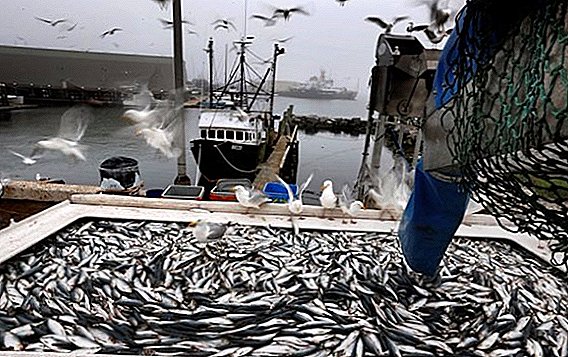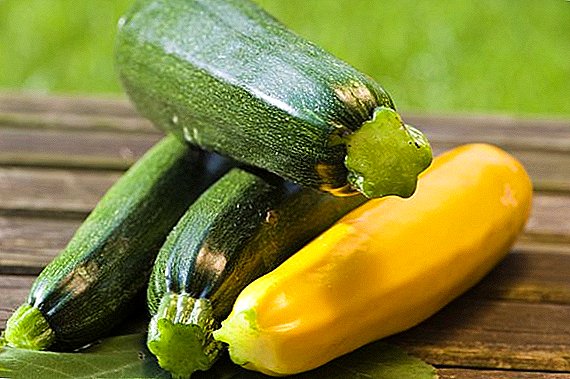 With the beginning of warm spring days at the gardeners, the active period starts - preparing the soil, planting various fruit and berry and vegetable crops. One of the most common types of vegetables that grows in almost every garden is zucchini, a one-year-old member of the Pumpkin family. Breeders bred a lot of different varieties of this tasty and healthy vegetable. In this article we will introduce you to some varieties of zucchini, their photos and a description of the characteristics of plants. We hope that having learned in more detail the description of varieties of zucchini, any owner of the dacha and even a novice gardener from the huge range presented on sale will be able to choose the most suitable option for planting on his site.
With the beginning of warm spring days at the gardeners, the active period starts - preparing the soil, planting various fruit and berry and vegetable crops. One of the most common types of vegetables that grows in almost every garden is zucchini, a one-year-old member of the Pumpkin family. Breeders bred a lot of different varieties of this tasty and healthy vegetable. In this article we will introduce you to some varieties of zucchini, their photos and a description of the characteristics of plants. We hope that having learned in more detail the description of varieties of zucchini, any owner of the dacha and even a novice gardener from the huge range presented on sale will be able to choose the most suitable option for planting on his site.
Important! Harvesting zucchini need to be done 2-3 times a week, because they very quickly become overripe and tasteless.
"Gribovsky 37"

The variety "Gribovskiy 37" is a highly branched, powerful bush with large pentagonal leaves of saturated green color on the petioles up to 30 cm long. Fruiting starts 50 days after sowing the seeds. Fruits are usually medium in size up to 20 cm long and weighing 800-1300 g cylindrical light green with white juicy flesh. Productivity "Gribovsky 37" - about 8.5 kg from 1 square. m, which makes it one of the most high-yielding among other varieties of this useful vegetable. The taste of this zucchini is excellent, it is suitable for canning and heat treatment for cooking any dish. A characteristic feature of the species is a good tolerability of prolonged cold snaps, high plant yields and unpretentiousness to growing conditions in open ground.
"Aeronaut"

"Aeronaut" is a compact shrub with one short main shoot and several lashes. The bushes are small in size, which allows them to be grown according to the 40 x 50 cm scheme in a small area of the site. This type of vegetable can be grown in both open and closed conditions. Harvest can be 50 days after sowing. Dark green fruits are elongated, smooth neat shape, weighing up to 1500 g and up 13-15 cm long. The heart of the vegetable is white, tender, juicy, low in sugar, which allows people with diabetes to eat it. Characterized by "aeronaut" high yields - up to 8 kg from 1 m² vulnerability to viruses and various diseases, the need for regular watering in the morning and evening. The crop is well transported and stored for a long time.
The best predecessors of zucchini in the garden: potatoes, cabbage, onions, carrots, radishes, beets, celery, peas, beans, onions, spinach, lettuce, dill, rhubarb, sorrel and parsley.
"Golden"

“Golden” is a compact bush with small lashes and dark green pentagonal leaves. The fruit of this zucchini is elongated and thin, bright yellow in color with a smooth, dense skin. The fruit core has a sweet taste, juicy, dense and slightly crunchy, such characteristics resemble a cucumber. Usually zucchini "golden" grows up to 14-15 cm long and reaches weights about 500 g The variety is perfect for feeding young children and people on a diet, as well as for various types of canning. For good development and fruiting, this variety is recommended to be grown in fertile or neutral soil with a planting scheme of 60x60 cm.
Did you know? Breeders bred an unusual variety of zucchini - "macaroni", its pulp has a fibrous structure, which in its disintegrated form is very similar to pasta.
"White"

The white variety is an ultra-fast-growing vegetable with a high yield, which is absolutely not picky about growing conditions. Fruiting vegetable begins 35 days after sowing the seeds. Fruits are pale green in color, small, long up to 16 cm and weighing 600-900 g with a delicate thin skinned. The zucchini flesh is juicy, light beige, it contains a small proportion of sugar, which makes this vegetable a dietary product. A characteristic feature of the "white" is a good resistance to many diseases and a long shelf life of the crop.
Important! Using for planting the seeds of zucchini grown 2-3 years ago, you can get a richer crop compared with annual seeds.
"White-fruited"

The grade "white-fruited" represents the early grade intended for cultivation in the greenhouse. The plant prefers an increased level of humidity and warm air, does not require a large landing area for good development. Fruiting begins about 40 days after sowing the seeds. Vegetable forms a compact bush with developed lateral lashes. The fruit is pear-shaped and white in color with a firm, smooth skin. The flesh of the "white" cream color medium density. Zucchini reaches a mass of about 700-900 g and lengths up to 16 cm, suitable for preparing various vegetable dishes and canning.
"Kid"

Squash "baby" is a shrub with upright stem and powerful roots. Fruit harvesting takes place on the 40th day after planting, the crop is ripening en masse. Fruits grow up to 18-19 cm long their shade is light green with dense white flesh. Weight "baby" is usually 600-900 g. The variety is suitable for both greenhouses and open ground. Characteristics - prone to frost, light and heat-loving, after harvest the fruit is well preserved for a long time and transported without damage.
"Tsukesha"

"Tsukesha" - zucchini with a medium-sized weakly branchy bush of compact form. Suitable for planting in protected and open ground. Crop ripening is about 45 days after sowing the seeds. The fruit is cylindrical in shape, has a dark green tint with dotted inclusions of bright colors weight up to 1000 A characteristic feature of the "tsukeshi" - good resistance to rapid cooling at the beginning of fruiting, the harvest has good taste and long shelf life. Pondering the question of which sorts of zucchini produce a big crop, many gardeners will gladly share their knowledge about the tsukesha variety, one bush of which can spoil up to 12 kg of vegetables, which is rare among vegetables.
Did you know? People started growing zucchini more than 4 thousand years ago.
"Zebra"

"Zebra" is a compact zucchini squash bush with a short main shoot and a small number of lashes. Vegetation begins after 38 days, the variety is suitable for growing in closed and open ground conditions. Zebra zucchini cylindrical, slightly ribbed with alternating pale green and dark stripes weighing up to 500 g The core is creamy yellow, juicy, low in sugar. The rind is thick and glossy. A characteristic feature of the "zebra" is a high yield, cold resistance, short-term developmental stops do not interfere with the further growth and fruiting of the plant. Vegetable tolerates transportation over long distances.
Compatible plants with zucchini in the garden: corn, onion, beet, tomato.
"Negro"

Zucchini squash is the most unusual in the photo, because the color of its fruit is green and black. On a small bush grows few foliage and mostly female flowers, which later give elongated cylindrical fruits. Pulp of vegetable juicy green shade with good flavoring characteristics. Harvesting takes place on the 40th day after sowing. This grade well keeps its presentation for a long time. A characteristic feature - resistant to powdery mildew infection.
Did you know? Zucchini is a very light-loving plant, when growing in a shady place, the grower will receive tasteless fruits.
"Mountain"

Zucchini "mountain" is a weakly branchy shrub with a short main stem. Harvesting is carried out 40 days after sowing. Fruit "mountain" white color with a cylindrical shape, weight about 500-800 g and up to 15 cm long The peel is smooth and very hard, the core is white and of medium density. The variety is universal, suitable for pickling and cooking various dishes.
Choosing zucchini seeds in preparation for planting and planting vegetables on your plot, you should know the names of the best varieties for open and closed ground to make the right choice, taking into account the desired yield, the appearance of the fruit and the conditions for their cultivation. We very much hope that the information provided on popular varieties of zucchini will be useful to you during garden work, and your rich harvest will be tasty and beautiful.












